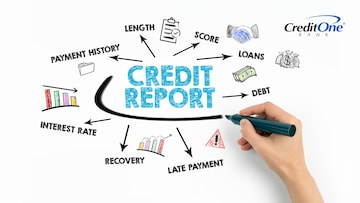7 Reasons to Check Your Credit Reports Annually
November 12, 2021
Checking your credit reports annually is easy, free, and could protect and even improve your credit and finances. So, what are you waiting for?

With a new year approaching, it’s time to once again examine our behaviors and habits over the past year in order to formulate those dreaded New Year’s Resolutions lists. The good news is that every resolution on that list doesn’t have to be painful. There’s one you can implement that could improve your finances, help you stay on top of your credit, protect you from fraud and identity theft, and possibly even improve your credit score. And it’s easy and free to do.
Yes, resolving to check your credit reports from each of the three major credit bureaus—Experian®, Equifax®, and TransUnion®—at least once a year could help you achieve all of the above in one fell swoop.
Still not sold? Well, read on to learn seven persuasive reasons you should check your credit reports at a minimum of once a year.
1. Just Knowing Your Credit Score Is Not Good Enough
Your credit score is a three-digit number that gives you, and potential lenders, an idea of your creditworthiness. It does not, however, provide you with the details of how you’re doing managing your credit. That’s because your credit score is derived from the information contained in your credit reports, so the only way to actually see the details of your credit behavior is to view that information. To do that, you need to access your credit reports.
Think of credit scores and credit reports in terms of grade point averages and report cards. If a student has a 3.8 GPA (out of a possible 4.0), that means they’re doing very well with their studies. But the only way to know how they’re doing in the individual classes they’re taking is to view their report card. With the report card, you can see how they’re managing each individual class and maybe even review a teacher comment or two.
Well, it’s the same with credit reports. By examining your credit reports, you can see how you’re doing with your individual credit accounts—at least the ones that report to one or all of the three major credit bureaus.
2. Checking Your Credit Reports Is a Good Way to Find Errors
Nobody’s perfect, including consumer credit bureaus and the creditors that report to them. Mistakes do get made.
By actually going through your credit reports at least once a year, you should be able to identify any mistakes, errors, or misinformation. And why is it important that your credit reports be up-to-date, factual, and correct?
Again, it’s important because your credit score is based on the information contained in your credit reports. If some of that information is wrong, then you may be getting shortchanged some credit score points you have coming to you.
Let’s go back to the GPA/report card analogy. If your American History teacher gives you a C for the term because her records incorrectly indicate you didn’t turn in your term paper on President James K. Polk’s “Fifty-Four Forty or Fight” campaign slogan, then your cumulative GPA will suffer. Meanwhile, say that you have your graded paper in your possession, with a prominent A- marked on it, which should’ve earned you a B+ for the class. By knowing that teacher made a mistake, you have the option of going to her, your term paper in hand, and making a compelling case to change your grade.
In the world of credit reports, this is called disputing an error, and it’s your right as a consumer. By initiating the dispute process, you may be able to correct any errors or inaccuracies, which could help to raise your credit score to where it should be if it was calculated using accurate information.
3. Finding Errors Could Save You Money and/or Provide Access to More or Better Credit
Certain inaccuracies or errors in your credit reports could be costing you money—namely the ones painting an inaccurate negative picture of your credit behavior. Information reporting things like “past due” status for on-time payments or showing closed accounts as open or listing bankruptcies that never happened could be damaging your credit. On the other hand, errors such as having the wrong home address for you won’t impact your credit, but it’s still important to update this information so it matches any information you may put in a credit application.
Here’s how credit report errors can cost you money. When you apply for a loan or credit card, if the potential lender is making a decision on whether to grant you credit based on erroneous information, you may be denied when you should’ve been approved. What’s more, even if you are granted credit, you may be extended a higher interest rate and/or less favorable terms than if the lender had based their credit offer on accurate information. It could even cost you a job, if your employer does an employment credit check and doesn’t like the inaccurate information they see.
4. Checking Your Credit Reports Is a Good Way to Detect Identity Theft or Fraud
By reviewing your credit reports at least once a year, you may be able to detect fraudulent charges or even identity theft. Let’s say, for example, that you review your credit reports and learn that the current balance being reported on your Visa card is $5,000, but you know for a fact that your balance should be no more than $1,000. Or, you’re reviewing your credit report and see that it’s reporting a trade line for a Mastercard account that’s past due and has a large outstanding balance. A Mastercard account you know for a fact you never opened.
These types of discrepancies in your credit reports are good indicators of potential fraud or identity theft. Once they’ve been identified, you can contact any creditors involved, let them know you suspect fraud, and have the accounts closed for your protection. Doing so could save you time, money, and headaches down the road.
If the discrepancies prove to be fraud or identity theft, then you should not be liable for any of the charges. However, it’s always better to identify issues earlier rather than later so fraudsters and identity thieves can’t continue to perpetrate their crimes at the expense of your credit.
5. Checking Your Credit Reports Won’t Harm Your Credit
Perhaps you’ve been putting off checking your credit reports because you’ve heard that, when someone checks your credit reports, it can lower your credit score by a few points. Well, this is not something you should worry about. Checking your own credit reports does not affect your credit in any way.
If you apply for credit, and a potential lender checks your credit reports, this could, in fact, lower your credit score because the lender generates what’s called a hard inquiry. A single hard inquiry typically lowers your credit score one to five points. You checking your own credit reports, however, is considered a soft inquiry, and soft inquires have no effect on your credit score.
So, not only will checking your own credit reports not harm your credit, if you find errors or inaccuracies that are harming your credit, disputing them and getting them rectified could result in a credit score increase.
6. Staggering Credit Report Checks Helps Keep You Covered the Entire Year
By federal law, you’re entitled to one free copy of your credit report from each of the major credit bureaus every 12 months. But, here’s the thing, you don’t have to get them all at once. If instead you spread out checking your reports throughout the year—say, check your Experian report in January, your Equifax report in May, and your TransUnion report in September—you’ll have a decent idea of what’s being reported all year long.
Just be aware that the information contained in your credit reports from each of the three credit bureaus may differ slightly. That’s because lenders and other creditors, under the Fair Credit Reporting Act, are not required by law to report your information to all three bureaus. In fact, they’re not required to report your information to any of the credit bureaus if they don’t want to. It’s strictly voluntary.
Still, checking your credit report every four months, even if it’s not an apples-to-apples comparison, is a good way to stay on top of potential issues.
7. Checking Your Credit Reports Annually Is Free
It costs you nothing to check your credit reports once a year except a few minutes to go online and enter some personal information at AnnualCreditReport.com. Then, it’s just a matter of answering three security questions to verify it’s actually you doing the requesting.
What’s more, because of the uncertainty of the pandemic and COVID-19-related scams, as of the time of this writing, you can get a free weekly credit report from each of the three credit bureaus until April 20, 2022. So, you can monitor your credit reports on a weekly basis. Or, if you stagger reports throughout the week, every two to three days if you wish—all for a grand total cost of $0!
If you haven’t already, resolve to review each of your credit reports at least once in 2022. Better yet, get started today by visiting AnnualCreditReport.com and downloading one or all three of your credit reports now. It’ll be the easiest resolution you make, and it could start paying immediate returns.
After realizing he couldn’t pay back his outrageous film school student loans with rejection notices from Hollywood studios, Sean focused his screenwriting skills on scripting corporate videos. Videos led to marketing communications, which led to articles and, before he knew it, Sean was making a living as a writer. He continues to do so today by leveraging his expertise in credit, financial planning, wealth-building, and living your best life for Credit One Bank.



![How Long Information Stays in Credit Reports [Infographic]](/content/dam/cob-corp-acquisition/images/articles/2021/03/104429 COC_5_102166_How Long.jpg?imwidth=360)
